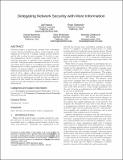Delegating Network Security with More Information
Author(s)
Naous, Jad; Stutsman, Ryan; Mazieres, David; McKeown, Nick; Zeldovich, Nickolai
DownloadZeldovich_Delegating network.pdf (180.3Kb)
OPEN_ACCESS_POLICY
Open Access Policy
Creative Commons Attribution-Noncommercial-Share Alike
Terms of use
Metadata
Show full item recordAbstract
Network security is gravitating towards more centralized control. Strong centralization places a heavy burden on the administrator who has to manage complex security policies and be able to adapt to users' requests. To be able to cope, the administrator needs to delegate some control back to end-hosts and users, a capability that is missing in today's networks. Delegation makes administrators less of a bottleneck when policy needs to be modified and allows network administration to follow organizational lines. To enable delegation, we propose ident++ - a simple protocol to request additional information from end-hosts and networks on the path of a flow. ident++ allows users and end-hosts to participate in network security enforcement by providing information that the administrator might not have or rules to be enforced on their behalf. In this paper we describe ident++ and how it provides delegation and enables flexible and powerful policies.
Date issued
2009-08Department
Massachusetts Institute of Technology. Computer Science and Artificial Intelligence Laboratory; Massachusetts Institute of Technology. Department of Electrical Engineering and Computer ScienceJournal
Proceedings of the 1st ACM Workshop on Research on Enterprise Networking, WREN '09
Publisher
Association for Computing Machinery
Citation
Naous, Jad et al. “Delegating network security with more information.” in WREN '09, Proceedings of the 1st ACM workshop on Research on enterprise networking, August 21, 2009, Barcelona, Spain, ACM Press.
Version: Author's final manuscript
ISBN
9781605584430